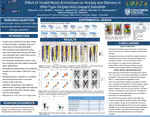
Introduction: The investigation of environmental factors and their impact on animal behavior has unveiled intriguing findings regarding anxiety reduction in Danio rerio (Zebrafish) . In this study, we examined the potential anxiolytic effects of Vivaldi music enrichment on male and female adult wild type Zebrafish using the novel tank and novel object recognition tests. Our aim was to gain insights into the influence of music as an environmental enrichment strategy and its implications for anxiety and memory in Zebrafish.
Methods: Zebrafish were subjected to Vivaldi music as an environmental enrichment intervention, and their behavior was assessed using two well-established tests: the novel tank test and the novel object recognition test. The novel tank test served as a measure of anxiety, with Zebrafish spending more time in the lower portion of the tank indicating elevated anxiety levels. The novel object recognition test evaluated memory, with Zebrafish expected to spend more time with a familiar object than a novel one.
Results: In the novel tank test, Zebrafish exposed to Vivaldi music enrichment displayed a notable shift in their behavior. Enriched fish tended to spend more time in the top zone of the tank, indicating reduced anxiety levels compared to controls. Furthermore, enriched fish exhibited increased time spent in the top and middle zones compared to their behavior prior to enrichment, suggesting a positive effect of music enrichment.
The novel object recognition test revealed interesting observations. Both control and enriched fish demonstrated a recognition preference for one of the novel objects. However, after a 6-minute retention interval, enriched fish displayed varied responses, with some individuals spending more time with the familiar object, while others did not. Statistical analysis did not yield significant differences, prompting further investigation into the complexities of memory and individual differences.
Discussion: The results of our study support the hypothesis that Vivaldi music enrichment can reduce anxiety levels in Zebrafish, as evidenced by their increased exploration of the upper zones in the novel tank test. While the recognition preference for novel object b in the novel object recognition test suggests a positive impact of music enrichment on memory, the lack of statistical significance and individual variations warrant further exploration.
Future Directions: Building upon these findings, future studies can expand our understanding of Zebrafish behavior and cognition. By incorporating the novel tank and novel object recognition tests into an inducible transgenic Zebrafish model of adult demyelination and remyelination, researchers can investigate the effect of music enrichment on the myelin repair process and associated behavioral and molecular changes. This integrative approach holds promise for unraveling the intricate connections between environmental enrichment, brain health, and behavior in Zebrafish.
Conclusion: Our study provides valuable insights into the anxiolytic potential of Vivaldi music enrichment in Zebrafish. The observed reduction in anxiety levels and the nuanced responses in memory-related tasks highlight the need for further investigation. These findings contribute to the growing body of research on environmental enrichment and its impact on animal behavior, paving the way for future endeavors aimed at comprehensively understanding the complex interplay between environmental factors, brain function, and behavior in Zebrafish.
